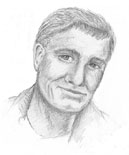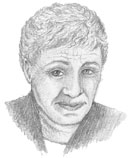The Next Faithful Step
Episode 20: Hazel's Wedding
Almond Springs (Scott Cormode, Fuller Seminary)
Ansel Richards made an appointment to see his pastor, the Reverend Charlotte Robinson of the First Church of Almond Springs, California. And this worried Charlotte. Ansel usually showed up uannounced and already agitated. It was the middle of February. Two weeks after Doc Davis had brought Gary Rivers to see Charlotte and a week after Doc had married Hazel Moore (the town librarian). Something was going on, but she did not know what.

Ansel Richards
Ansel arrived five minutes early for his meeting with Charlotte and sat quietly in a chair. "What's on your mind, Ansel?" the pastor began. Ansel jiggled his leg as he tried to form an answer, "Well, it's like this. I want to talk to you because you know what's important to me and because you know I would never compromise on what's important and, well, you saw what happened." "Tell me about it," Charlotte said wondering where he was going.
"I'm afraid Hazel might be right about the housing project." This puzzled Charlotte because in all the discussion about the proposed development, she could not recall Hazel saying anything one way or another. Nor did she think that Ansel and Hazel were all that close. "What did Hazel say?" she asked.

Hazel Moore
"She told me why she was marrying Doc," Ansel began. "I never really understood the match. I had come to think of Doc as kind of a dupe for the mayor and others who wished to build the housing tract. And so I expected that Hazel would side with her fiance instead of helping me in the debate over the project. But two days after Doc and Hazel announced their engagement in church, I found a bundle of research in my mailbox at the school. The previous week I had spent an afternoon in the town library digging up facts that I could use to persuade the town to save the glen from the developers. I guess Hazel kept digging after I left. She continued to help me even though she was marrying the enemy." Charlotte chuckled inwardly at Ansel's habit of painting everyone in bold strokes. All were either friend or foe.
"The contradiction bothered me so much," Ansel continued, "that I visited her at the library just after the Town Meeting. In my usual way-too-blunt way I came out and asked her how she could marry him and help me?" Ansel stood up and began pacing around Charlotte's office as he continued the story.
"Hazel's answer was really intense. I was floored. You know how demure she usually is when she talks. I can still tell you exactly what she said, 'Ansel,' she said, 'let me ask you a question. If you were in a car accident on the way home today, God forbid, who would be by your side in the hospital? Doc would. Would it matter whether he agreed with you or not? Not in the least. And, if Louis Walsh's grandson were in your science class, would you teach him well? Of course you would—because what you do matters. The community counts on you to do something that none of the rest of us could ever do. You get junior high kids interested in learning. It's a gift. And it's a calling.'" He paused to make sure that the pastor understood how much this had affected him. Then he continued.
"She said what I do is a calling but then she told me that she does something really important around here too. She said she tries to make sure that our community makes informed decisions. High school kids come to her searching for colleges. And she helps them choose a place that fits who they are. Some people come into the library to research stocks or to find out about their family's roots. She totally knew why what she did was important."
"Then she said to me, 'Ansel, it is really tempting to make a decision without doing your homework, without knowing the consequences.' Then she looked right at me and used the same tone I use with my students when they don't do their homework. 'Did you look carefully at the papers I left with you?' she said to me. And I hadn't looked at them except to read the titles. She told me, 'Not all of them supported your position.' Some of the papers talked about the environmental cost of small town decay. Then she told me what would happen if our town loses its ecomonic base—the environment will suffer. The trees in the glen may go right on growing but other very bad things could happen. What if the Pha family has to close the dry cleaners? Do you think that all the chemicals in that building would end up in a toxic waste dump? No, they'd probably go out with the evening trash, find their way to a landfill and perhaps into the ground water. Charlotte, what am I going to do?"
Charlotte started to speak. But Ansel was already talking again. "Oh, and then she told me why she was marrying Doc. 'How can I marry Doc and help you?' she said to me, 'I am marrying Doc because we have loved each other from a distance for a very long time. I help you because you are important to this town—too important to make difficult decisions without looking at the big picture.' And then she just looked at me. She thinks I'm wrong and she's just too polite to say so." Ansel turned and looked at the pastor. She waited for him to continue. Then she asked him, "What happened when you read the material she left for you?"
Ansel ignored the question and kept telling his story. "Before I read her material, I was at the wedding. As I watched Hazel marry Doc, I decided to make an appointment to talk with you. I still don't trust Louis Walsh [the mayor], but I trust Doc and I trust Hazel. They have given themselves for this community. I still think that the housing project is bad for the environment. But I just can't bring myself to say that Doc and Hazel are immoral people for what they are doing. I still can't stand the idea of turning our little village into some kind of suburb. And I can't bear to think of a Starbuck's coffee place on the corner." He shuddered for effect.
"But I understand the problem," Ansel continued, "I have a student who I know isn't eating right. I invented a special science award for him so that he gets to eat breakfasts and lunches at school for free all Spring semester. But that's only the tip of the iceberg. And I know it." And then Ansel plopped down into the chair. Charlotte finally got to speak.
"It sounds like you want to provide a way to allow the town to prosper without having to sacrifice your loyalty to the environment," Charlotte said. "Yeah," was Ansel's only reply. "And it sounds like you are worried that doing the right thing is going to take away the very things that you love most about this town—the isolation and the unhurried life," she said. "Yeah, and I feel so selfish," he said, "But it's important to me."
"Well, it's OK to feel what you're feeling." she replied, wincing internally at the cliche. "You came to Almond Springs for a very good reason: to get away from the city. And now you find that you may have to give up something that is important to you for an even bigger reason. And you're too honest a person to hide from your obligations. Do you think that you're a bit angry and afraid of what the future might hold?"
"Pastor," Ansel said after a few moments, "I am sitting here thinking that I know what I have to do and I am just not sure I am ready to do it yet. Can I come back tomorrow after school? The sun is going down right now. And I want to take a walk on the glen. I'm going to need your help knowing how to proceed once I decide I am ready to do what I have to do."
"I'll see you tomorrow Ansel," Charlotte said. And then he left.
